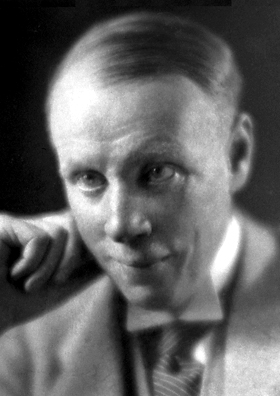Sinclair Lewis
| Sinclair Lewis | |
|---|---|
 |
|
| Born | Harry Sinclair Lewis February 7, 1885 Sauk Centre, Minnesota, United States |
| Died | January 10, 1951 (aged 65) Rome, Italy |
| Occupation | Novelist, playwright, short story writer |
| Nationality | American |
| Alma mater | Yale University |
| Notable awards |
Nobel Prize in Literature 1930 |
| Spouse | Grace Livingston Hegger (1914–1928) (divorced) Dorothy Thompson (1928–1942) (divorced) |
| Children | 2 |
|
|
|
| Signature | |
Harry Sinclair Lewis February 7, 1885 – January 10, 1951) was an American novelist, short-story writer, and playwright. In 1930, he became the first writer from the United States to receive the Nobel Prize in Literature, which was awarded "for his vigorous and graphic art of description and his ability to create, with wit and humor, new types of characters." His works are known for their insightful and critical views of American capitalism and materialism between the wars. He is also respected for his strong characterizations of modern working women. H. L. Mencken wrote of him, "[If] there was ever a novelist among us with an authentic call to the trade ... it is this red-haired tornado from the Minnesota wilds."
He has been honored by the U.S. Postal Service with a postage stamp in the Great Americans series.
Born February 7, 1885, in the village of Sauk Centre, Minnesota, Sinclair Lewis began reading books at a young age and kept a diary. He had two siblings, Fred (born 1875) and Claude (born 1878). His father, Edwin J. Lewis, was a physician and a stern disciplinarian who had difficulty relating to his sensitive, unathletic third son. Lewis's mother, Emma Kermott Lewis, died in 1891. The following year, Edwin Lewis married Isabel Warner, whose company young Lewis apparently enjoyed. Throughout his lonely boyhood, the ungainly Lewis—tall, extremely thin, stricken with acne and somewhat pop-eyed—had trouble gaining friends and pined after various local girls. At the age of 13 he unsuccessfully ran away from home, wanting to become a drummer boy in the Spanish–American War. Lewis was also nonreligious and an atheist.
In late 1902 Lewis left home for a year at Oberlin Academy (the then-preparatory department of Oberlin College) to qualify for acceptance by Yale University. While at Oberlin, he developed a religious enthusiasm that waxed and waned for much of his remaining teenage years. He entered Yale in 1903 but did not receive his bachelor's degree until 1908, having taken time off to work at Helicon Home Colony, Upton Sinclair's cooperative-living colony in Englewood, New Jersey, and to travel to Panama. Lewis's unprepossessing looks, "fresh" country manners and seemingly self-important loquacity made it difficult for him to win and keep friends at Oberlin and Yale. He did initiate a few relatively long-lived friendships among students and professors, some of whom recognized his promise as a writer.
...
Wikipedia
